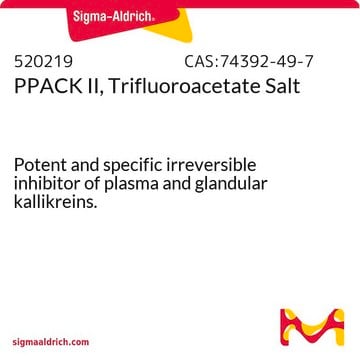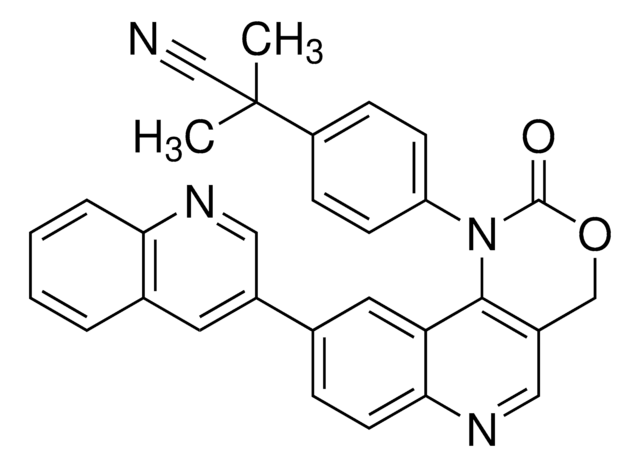118502
ATM Kinase Inhibitor
InSolution, ≥95%
Sinónimos:
InSolution ATM Kinase Inhibitor
Iniciar sesiónpara Ver la Fijación de precios por contrato y de la organización
About This Item
Fórmula empírica (notación de Hill):
C21H17NO3S2
Peso molecular:
395.49
UNSPSC Code:
12352200
NACRES:
NA.77
Productos recomendados
Quality Level
assay
≥95% (HPLC)
form
liquid
manufacturer/tradename
Calbiochem®
storage condition
OK to freeze
desiccated (hygroscopic)
protect from light
shipped in
wet ice
storage temp.
−20°C
General description
A cell-permeable disubstituted pyranone compound that acts as a potent and ATP-competitive inhibitor of ATM kinase (IC50 = 13 nM; Ki = 2.2 nM). Displays excellent selectivity over other PIKK family kinases (IC50 = 2.5, 9.3, 16.6 µM for DNA-PK, mTOR, PI 3-K, respectively; IC50 >100 µM for PI 4-K and ATR) and exhibits little activity towards a panel of 60 other kinases even at concentrations as high as 10 µM. Inhibits ATM-dependent cellular protein phosphorylation following ionizing radiation (IR) and sensitizes cells with wild-type ATM, but not mutant ATM, to the cytotoxic effects of IR and DNA-damaging agents.
Packaging
Packaged under inert gas
Warning
Toxicity: Irritant (B)
Physical form
A 10 mM (2 mg/506 µl) solution of ATM Kinase Inhibitor (Cat. No. 118500) in DMSO.
Reconstitution
Following initial thaw, aliquot and freeze (-20°C).
Other Notes
Pereg, Y., et al. 2005. Proc. Natl. Acad. Sci. USA102, 5056.
Lau, A., et al. 2005. Nat. Cell Biol.7, 493.
Hickson, I., et al. 2004. Cancer Res.64, 9152.
Lau, A., et al. 2005. Nat. Cell Biol.7, 493.
Hickson, I., et al. 2004. Cancer Res.64, 9152.
Legal Information
CALBIOCHEM is a registered trademark of Merck KGaA, Darmstadt, Germany
Storage Class
10 - Combustible liquids
wgk_germany
WGK 2
flash_point_f
188.6 °F - closed cup - (Dimethylsulfoxide)
flash_point_c
87 °C - closed cup - (Dimethylsulfoxide)
Certificados de análisis (COA)
Busque Certificados de análisis (COA) introduciendo el número de lote del producto. Los números de lote se encuentran en la etiqueta del producto después de las palabras «Lot» o «Batch»
¿Ya tiene este producto?
Encuentre la documentación para los productos que ha comprado recientemente en la Biblioteca de documentos.
Ian Hickson et al.
Cancer research, 64(24), 9152-9159 (2004-12-18)
The serine/threonine protein kinase ATM signals to cell cycle and DNA repair components by phosphorylating downstream targets such as p53, CHK2, NBS1, and BRCA1. Mutation of ATM occurs in the human autosomal recessive disorder ataxia-telangiectasia, which is characterized by hypersensitivity
Alan Lau et al.
Nature cell biology, 7(5), 493-500 (2005-04-19)
Chemotherapy that is used to treat human immunodeficiency virus type-1 (HIV-1) infection focuses primarily on targeting virally encoded proteins. However, the combination of a short retroviral life cycle and high mutation rate leads to the selection of drug-resistant HIV-1 variants.
Yaron Pereg et al.
Proceedings of the National Academy of Sciences of the United States of America, 102(14), 5056-5061 (2005-03-25)
Maintenance of genomic stability depends on the DNA damage response, an extensive signaling network that is activated by DNA lesions such as double-strand breaks (DSBs). The primary activator of the mammalian DSB response is the nuclear protein kinase ataxia-telangiectasia, mutated
Consuelo Pitolli et al.
Journal of experimental & clinical cancer research : CR, 42(1), 214-214 (2023-08-21)
Medulloblastoma (MB) is the most common cerebellar malignancy during childhood. Among MB, MYC-amplified Group 3 tumors display the worst prognosis. MYC is an oncogenic transcription factor currently thought to be undruggable. Nevertheless, targeting MYC-dependent processes (i.e. transcription and RNA processing
Estelle Vincendeau et al.
Nature communications, 13(1), 3707-3707 (2022-06-29)
SHLD1 is part of the Shieldin (SHLD) complex, which acts downstream of 53BP1 to counteract DNA double-strand break (DSB) end resection and promote DNA repair via non-homologous end-joining (NHEJ). While 53BP1 is essential for immunoglobulin heavy chain class switch recombination
Nuestro equipo de científicos tiene experiencia en todas las áreas de investigación: Ciencias de la vida, Ciencia de los materiales, Síntesis química, Cromatografía, Analítica y muchas otras.
Póngase en contacto con el Servicio técnico







